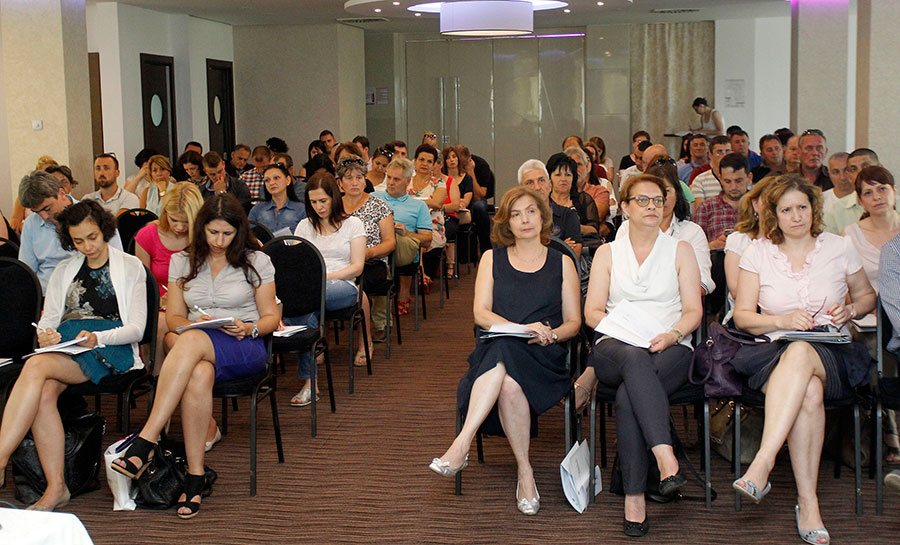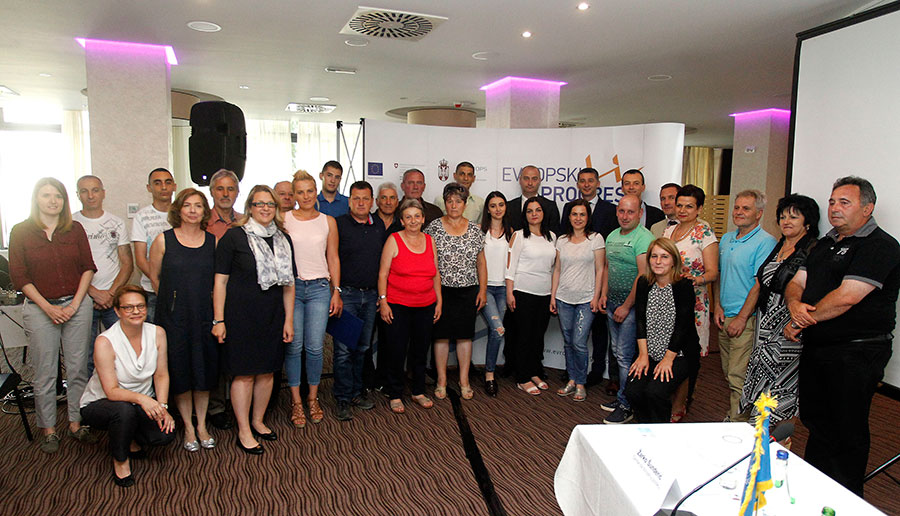The European Union and Swiss Government have secured grants for self-employment of 28 people whose ideas were seen as the best within a EUR170,000-worth project aimed at economic empowerment of vulnerable and marginalised groups in 34 local self-governments in South-East and South-West Serbia.
The project has been implemented in partnership with the Social Policy Centre, the Public Policy Research Centre and the Leskovac Educational Centre and, apart from the aforementioned outcome, one of its results has also been an analysis of local self-governments’ institutional capacity and an analysis of employability of vulnerable groups and social protection services in 34 towns and municipalities in the south of the country.
“Full social inclusion cannot be achieved without good education and employment. The projects supported by the EU and the Swiss Government in local self-governments included in the European PROGRES programme are, indeed, inclusive, as they cover a wider population and provide support to a broad scope of areas,” said Nenad Ivanisevic, State Secretary at the Ministry of Labour, Employment, Veteran and Social Affairs during the presentation of the project outcomes at the meeting titled “Improving Social Inclusion at the Local Level” held today in Nis.
According to the Team Manager of the Government Social Inclusion and Poverty Reduction Unit Ivan Sekulovic, the macroeconomic context is encouraging because more money in the state coffers means more efficiency and fairness because these are the principles that underpin inclusive development the way the European Union sees it.
 “Thanks to support of the EU and the Swiss Government, I have made my dream come true: I equipped my office and started my own legal practice,” said Alit Amzic, a lawyer from Aleksinac, one of the 28 beneficiaries granted up to EUR3,000 in equipment to launch their business under the public call for proposals which enabled them to employ a total of 84 people.
“Thanks to support of the EU and the Swiss Government, I have made my dream come true: I equipped my office and started my own legal practice,” said Alit Amzic, a lawyer from Aleksinac, one of the 28 beneficiaries granted up to EUR3,000 in equipment to launch their business under the public call for proposals which enabled them to employ a total of 84 people.
European PROGRES National Manager Marko Vujacic congratulated these fresh entrepreneurs and stressed that the EU and Swiss Government were committed to improving the lives people in the south of the country, with a particular focus on building the capacity of local administrations, both institutional and the capacity needed to develop and implement policies in the areas of social inclusion of vulnerable groups, including employment.
“The results of these project indicate not only the direction in which the local self-governments should be moving forward, but also indicate that they laid sound foundation for further improvement of their capacity. We hope that analyses and methodologies we have come up with, as well as the experience we gained, would facilitate identification of needs of vulnerable groups at the local level and development of relevant policies and innovative models of social protection services and employment, because society’s support is crucial for their social inclusion,” said Marko Vujacic.
In Bosilegrad, Bujanovac and Merosina, support was extended to the establishment of sustainable social service aimed at addressing the needs of population in accordance with the law. “Together, we have set up a new service, home care for the elderly. Such a service will not only help the largest vulnerable category across the three municipalities, but will also facilitate employment of unemployed women,” said Danijela Nikolic of the Merosina municipality.
As he expanded on the analysis of the state of institutional capacity and social protection in 34 towns and municipalities in Serbia, Zarko Sunderic of the Social Policy Centre said that the majority of local self-governments allocated rather modest funding for social protection, adding that services offered by the majority of local communities should be improved and made sustainable. “Local self-governments will thus have the capacity to better respond to the needs of vulnerable and marginalised groups,” Sunderic said.
The participants in the meeting underlined that, in order to implement any change in regulation or reform, it is necessary to establish cooperation between local authorities and institutions at the national level. Also, local self-governments need to put more focus on mutual cooperation and experience exchange in the areas of social protection and employment of vulnerable groups, as the pooling of resources and knowledge can speed up the reform process.
The European Union and the Government of Switzerland will support the activities of the European PROGRESS programme, which contributes to the sustainable development of the South and South West Serbia, with a total of EUR24.46 million. Approved projects will be aimed at strengthening local administration creating a favourable environment for the development of infrastructure and economy as well as improving the implementation of social inclusion and employment policy. The programme is implemented by the United Nations Office for Project Service (UNOPS).
The municipalities included in the programme are as follows: Novi Pazar, Ivanjica, Nova Varos, Priboj, Prijepolje, Raska, Sjenica and Tutin in South West Serbia, as well as Prokuplje, Blace, Zitoradja, Kursumlija, Leskovac, Bojnik, Vlasotince, Lebane, Medvedja, Crna Trava, Vranje, Bosilegrad, Bujanovac, Vladicin Han, Presevo, Surdulica, Trgoviste, Brus, Aleksinac, Gadzin Han, Doljevac, Merosina, Svrljig, Babusnica, Bela Palanka and Knjazevac in South East Serbia.




